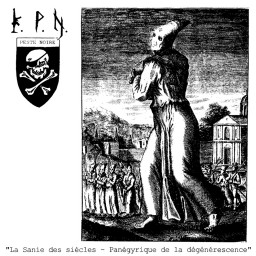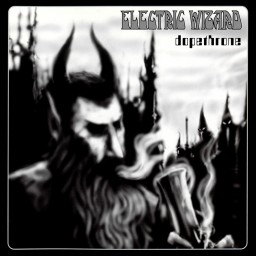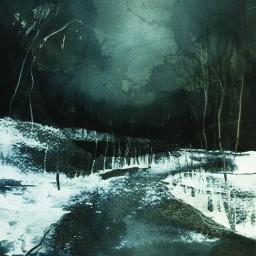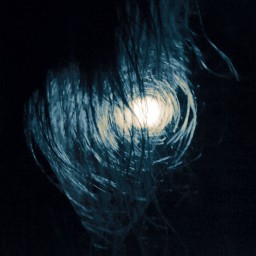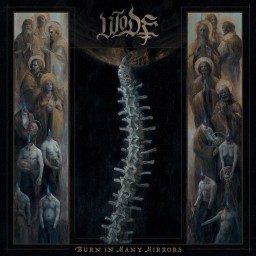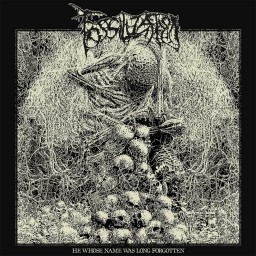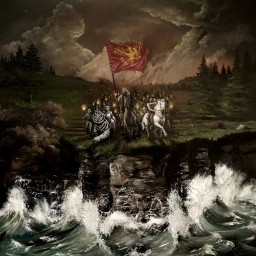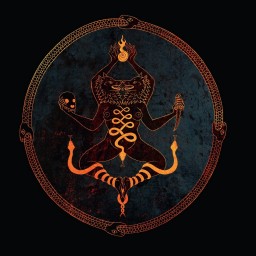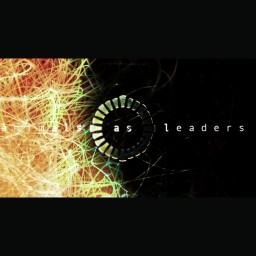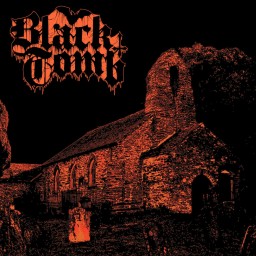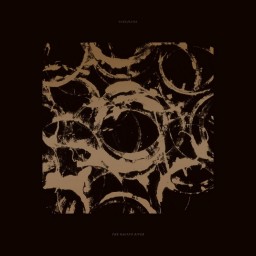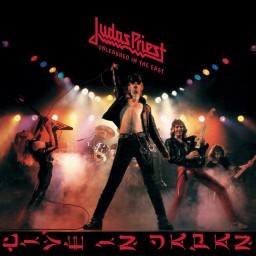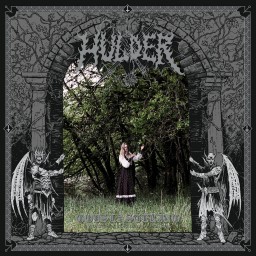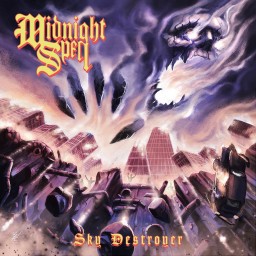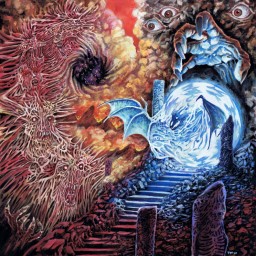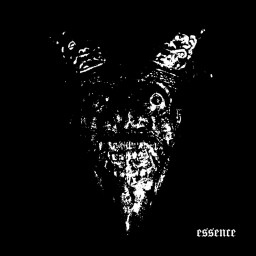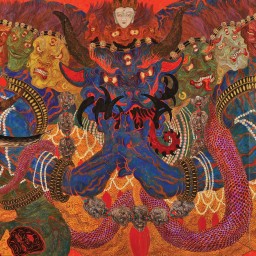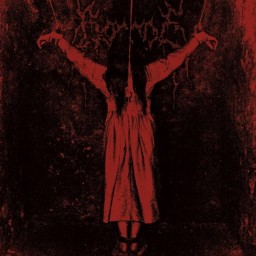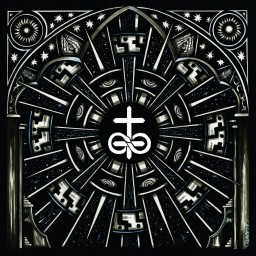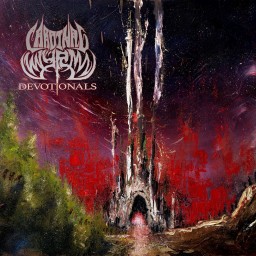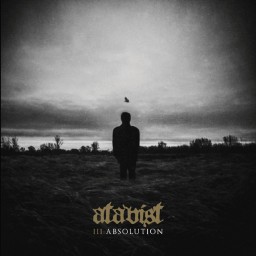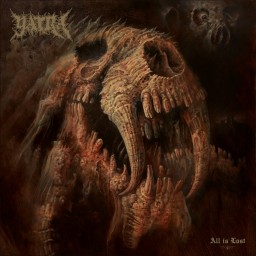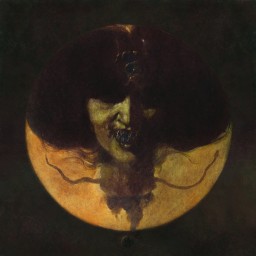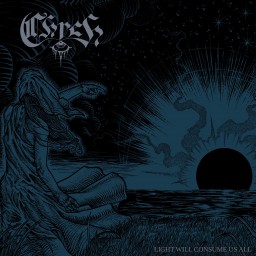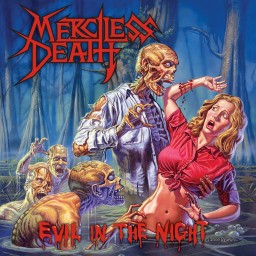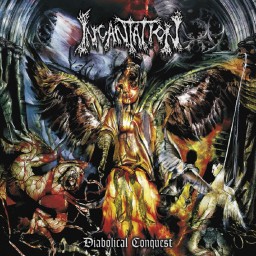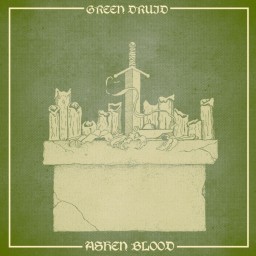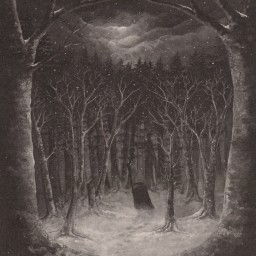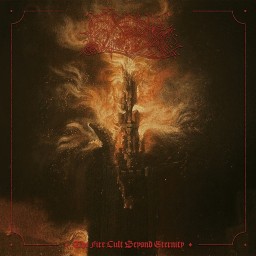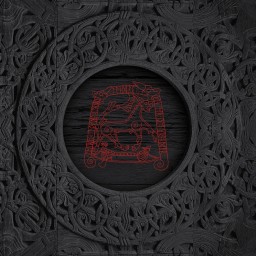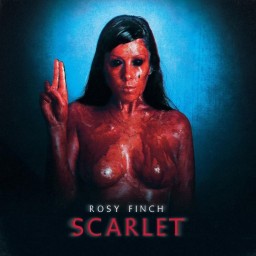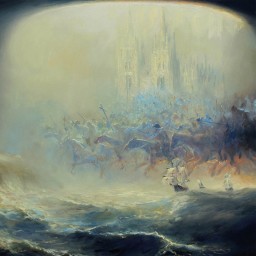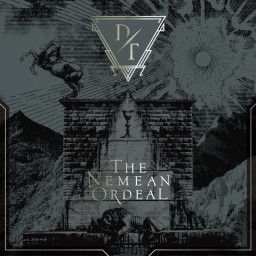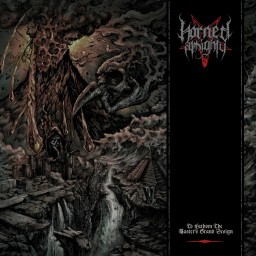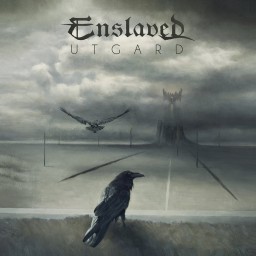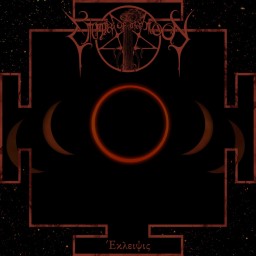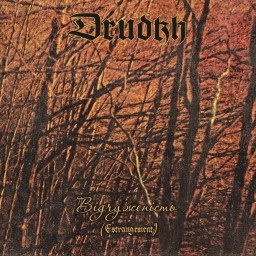Sonny's Reviews
Another band with which I have been unacquainted until now and yet another decent French black metal outfit. Our gallic cousins really do produce a lot of the better and more interesting modern black metal bands, I have to admit. Peste Noire, certainly on the evidence of this release, favour the lo-fi approach, albeit not as lo-fi as the commentary around this album would have you believe - the album does have some production values and I've certainly heard worse (or is that better?). The vocals are of the desperately shrieking type, reminiscent of those employed by some of the more demented depressive black metal outfits, that tap into something primal and horrifying in the human psyche, although this certainly is no DSBM album. Bizarrely and somewhat atypically for most black metal, there are a significant number of guitar solos on the album that may have come straight from the Gary Moore songbook which, in addition to the deranged vocals, contribute to the strangeness of the record and the sensation that things are not really what they are expected to be.
From all that I've read about the band there are members who seem to have some quite reprehensible views, a common pitfall for followers of black metal unfortunately and I guess that may colour how some people may receive the music. Putting all that aside, this is certainly a bit of a curveball as far as orthodox black metal goes and, for me personally, not a completely successful one - those solos for example just stick out like a sore thumb. Decent but no classic and I'm not sure if I would return to it that often, although the odd track like Spleen holds a lot of appeal for me.
Genres: Black Metal
Format: Album
Year: 2006
One of the main reasons I love modern black metal is that despite all the cookie-cutter copyists and plagiarists there are still bands that manage to surprise me. I was familiar with Ireland's Altar of Plagues via their 2011 album Mammal, which was a good record but didn't leave any especially lingering memory for me and hadn't really forced it's way into my list of top BM albums. So anyway, now we come to 2013's Teethed Glory and Injury which has most definitely registered itself into my black metal consciousness. I'm not sure I can do the album justice with a review, but I'l have a crack at it. Teethed Glory and Injury is most assuredly a black metal album, in fact more specifically an atmospheric black metal album, but it is also much more than that. Into it's blackened body the band weave various other influences such as industrial metal, atmospheric sludge and post-metal that results in a most progressive sounding record. I have also seen it labelled as avant-garde metal and while I can definitely understand why, I think it is too accessible and coherent to be so tagged.
The cover art seems to perfectly sum up the mood and atmosphere, a desperate and frustrated aura pervades the whole album. This is not the beautifully flowing atmo-black of Saor or Panopticon, this is a jagged, broken affair that doesn't extol the glory of the natural world, but seethes and rages against the world of man, the industrial interjections disturbing the flow of the more natural sounds of the black metal musings to a seemingly intended effect. This isn't the album's only trick though, there are tracks that draw on atmospheric sludge and post-metal to add another layer of despair and isolation. Whereas a lot of atmospheric black metal is airy and expansive, the muddier, sludgy production of this makes for a more claustrophobic and debilitating experience than your average WiiTR clone.
The musicianship is great and I think I must make mention of the depth of the bass tone and the ubiquitousness of Johnny King's drumming that sounds so natural, despite the variety of the tracks. The guitar work and vocals are both suitably intense and the electronics are deployed to devastating effect.
The band split-up after the release of this album and I can understand why. Following this album up would be a thankless task indeed and, after seemingly pouring their hearts and souls into this, meant that as a band they had nowhere else to go. Talk about going on the top of your game!
Genres: Black Metal Post-Metal
Format: Album
Year: 2013
The album that fulfills all the hysterical paranoia of parent's fears of drugs influencing their offspring's minds and causing them to turn to more drugs, sex, satanism, even more drugs and insanity - Reefer Madness brought to life. I'm sure it gives Jus Osborne a warm feeling inside to think what a record like this must do to the sensibilities of the so-called moral arbiters of the world and their hypocritical outrage must be like nectar to him.
Musically Dopethrone takes the template for stoner doom laid down by Sleep, slows it down then makes it exponentially heavier and lyrically more outrageous to produce the gold standard against which other stoner doom albums are measured. The tracks are all thick and miasmic like a smoke-saturated trip through a narcotically altered dreamscape, super-heavy jams that derive from some kind of psychedelic black hole where time is slowed, perceptions are altered and the music's thundering, hypnotic riffs take control, forcing the listener's head to nod, body to sway and mind to roam.
Electric Wizard are a band who revel in and glorify the partaking of narcotic substances, so are probably not for you if you subscribe to the straight edge, just say no philosophy of the morally superior. Personally it's been a long time since I was involved in any kind of drug scene, but a blast of Dopethrone is all it takes to relive those heady days of bongs, booze and b-movies. This album is a true counterculture classic and an album any stoner (or ex-stoner) metalhead should return to regularly for a required fix.
Genres: Doom Metal Stoner Metal
Format: Album
Year: 2000
Beauty is in the eye (or ears) of the beholder, or so they say and Agalloch are another of an ever-growing list of bands that I struggle to hear what makes them so revered in the metal community. I accept that the failing is wholly mine and I would never try to convince you that you are wrong and I am right. Now, don't misunderstand, I can plainly hear that they are a talented bunch, but in the main their music fails to move me as it evidently does others. That said, there are times, paticularly on this album, when I can perceive their brilliance, but for me that is when they are at their "least metal". The intro They Escaped the Weight of Darkness for example, is a lovely piece of music in it's simplicity, the lone cello providing a melancholy counterpoint to the peaceful field recording of birdsong and a babbling brook. I am less impressed by their brand of atmospheric black metal when in full flow, it somehow lacks the aggressive edge I prefer leaning more heavily towards a post-metal sound. The reedy guitar on Into the Painted Grey, the album's most black metal track, I had a particular issue with as it just sounded too thin and weak and The Watcher's Monolith was a track particularly guilty of diplaying gothic tendencies which seldom sits well with me. On the positive side, I think John Haughm is an excellent black metal vocalist, sounding just the right shade of ragged and savage.
The album's standout track is also it's longest, the seventeen minute epic Black Lake Niðstång, it's ominous tympanic opening giving way to a melodic section with whispered vocals that is derived of doom metal's atmospherics as Haughm's vocals become increasingly desperate until the track comes to a climax at around the ten-minute mark. From this point on the track then becomes even better as the synths take over and allow a real atmosphere of ominous anticipation to build until the track explodes into it's cathartic final minutes. Unfortunately, after the triumph of Black Lake Niðstång I found the rest of the album to be an anti-climax, it's post-black metal leanings taking over to such an extent that I couldn't really engage it at all from that point - and I did try, believe me.
I truly can understand why many people dig on Agalloch, at times they sound great to me too, but too often I just don't feel their music is aggressive or vital enough for black metal, but if you love your atmo-black tempered by post-metal trappings then Agalloch are one of the prime movers, but you know that alreasdy don't you?
Genres: Black Metal
Format: Album
Year: 2010
In the world of black and blackened metal there are some fantastic innovators, but there are countless more tedious copycats. It is a world of a few genuinely original artists and legions of less talented wannabes endlessly churning out the same old shit. Needless to say, Finland's Oranssi Pazuzu are most decidedly one of the former. According to counterculture lore, the hippies' psychedelic dream died at Altamont on 6th December 1969. If that's the case, then sometime during the early 2010s Oranssi Pazuzu disinterred it's partly-rotted corpse, breathed new life into it and bent it to their own nefarious purposes. The result is Värähtelijä.
The Finns take the sound of psychedelic and space rock and, by utilising some infernal alchemy, fuse it with the aesthetics of black metal to produce a hypnotic, disorienting aural landscape that is so suited to early 21st century life and the disconcerting (and possibly paranoid) feeling a lot of us get that "something is going on". OP's version of pysychedelia isn't love, peace and beautiful trips with rainbows and unicorns. No, theirs are the baddest of bad trips, threatening and disorientating. Anyone who has been a devotee of classic 60s UK TV series The Prisoner (yes, the one sampled on Maiden's Number of the Beast album) will never forget the fucked-up final episode that left everyone scratching their heads. Värähtelijä is to black metal what that episode was to British TV - disturbing, scary and absolutely mind-blowing (man!).
The album could be described as cosmic black metal, where that cosmos is not only awe-inspiring but also threatening in an indeterminable, Lovecraftian kind of way. The music is repetitive, but never boring. Instead it uses repetition to hypnotize the listener in a kind of ritualistic manner, while the electronics and black metal stylings, especially the vocals, induce an atmosphere of discomfort and unease to achieve the album's intention of unsettling it's listener, a goal to which any Black Metal artist worth their salt should surely aspire. Black Metal isn't meant to be comfortable and predictable, yet too often it is, so bands like Oranssi Pazuzu who can get under your skin and upset your expectations should be valued most highly by any real BM devotee.
Värähtelijä was my personal introduction to Oranssi Pazuzu, who are now one of my all-time favourite black metal acts, and ended up being my AOTY for 2016 as well as a cast-iron five star classic and one of the great black metal releases of the new century.
Genres: Black Metal Post-Metal
Format: Album
Year: 2016
My only previous contact with Kvelertak was their 2020 album Splid, which I found to be quite a fun record, despite it not really being the type of release I would normally listen to. This, their debut released in 2010, doesn't quite float my boat as well as the later album. This is supposedly an early example of so-called Black 'n' Roll. Now I don't know about that so much, but if I was attempting to pigeonhole Kvelertak's sound then I would have to tag it as blackened punk metal, but that sounds more like late 2000's / early 2010's Darkthrone which this patently isn't. This is a much catchier type of metal altogether, sounding almost like melodic metalcore at times (blackened metalcore anyone?). So, most definitely not my usual type of thing at all. I do love both punk and metal, but only rarely when combined together do they really chime with me - Darkthrone being one such band who have managed it to my satisfaction - but I did enjoy this in the main. The caveat being that I think all the best tracks are front loaded, so that the album's power wanes after the halfway mark - Sultans of Satan being a track I really didn't enjoy and marking the point at which the quality tapers off, losing a little of the earlier tracks immediacy. I think I would have liked to hear a bit more by way of clean vocals as well, personally I find Erlen Hjelvik's vocals gets a little wearying after a while (as I do with most hardcore-derived vocals to be honest).
In a way my reaction to this is similar to the reaction I had to my brush with Trivium's In Waves recently - I enjoyed it far more than I expected to, probably wouldn't respin it too often, but when I fancied something a bit outside my usual then I could quite happily spend an hour or so with it.
Genres: Black Metal
Format: Album
Year: 2010
Manchester's Wode are one of modern black metal's underrated and consitent bands and are one of the finest exponents of the genre to come out of England, in my opinion. They play frigid and blasphemous black metal, alloyed with death metal's brutality and violence, also throwing in some thrash metal sensibility for a sound that is at once modern whilst also harking back to the metal gods of previous decades.
The six tracks on offer here have a decent variety to them, from dissonant, Icelandic-influenced black metal to blackened thrashing harking back to the early days of Sodom and Hellhammer and powerful blackened death metal riffing, for an unholy and triumphant sound that may shake the very walls of heaven.
Genres: Black Metal
Format: Album
Year: 2021
Fossilization is a death metal band formed by a couple of members of excellent sludge metal outfit Jupiterian and this 25 minute EP is their debut release so, considering my love of both old-school death metal and Jupiterian's sludge, consequently I went into it with very high expectations. Unfortunately maybe these expectations were unrealistic and, in truth, I found this a little disappointing. It has a great cavernous sound as any decent old-school doom-ridden death metal should, but somehow the songs just don't grab me like I'd hoped. V's vocals that suit Jupiterian's sludge so well don't quite pull of the OSDM growl successfully and it all sometimes gets a little too frantic. Maybe it'll grow on me more as time passes, but for now it feels like a missed opportunity.
Genres: Death Metal Doom Metal
Format: EP
Year: 2021
Despite them having been around since 2007, this is the first time Les Chants de Nihil have crossed my path - and damn glad am I that they did so. In common with several other French outfits, it appears that they like to kick back against the confines of black metal and break out of the conventions that others follow doggedly. Le tyran et l'esthète (The Tyrant and the Aesthete) features a quite muscular sound that borrows heavily from death metal and as such is really aggressive sounding, with some powerful riffing. Despite that, it is still fairly melodic, but the band also incorporate dissonant elements which makes for a satisfying and interesting dichotomy.
This is obviously a concept album, the tracks feel like part of a greater whole, as well as being damn fine in their own right. Unfortunately the overarching concept escapes me as I'm not, in common with many native English speakers, very good at other languages. There is a deal of variety in the tracks as the band employ such elements as chanted sections à la Batushka, epic-sounding viking / folk metal parts and even a song based around the melodies from an Igor Stravinsky ballet (L'adoration de la Terre). These elements aren't, however, thrown together like some random hotchpotch just for the sake of it, the individual tracks are well-written and are tastefully woven together in a way that allows the album to flow seemingly effortlessly through it's fifty minutes or so runtime.
It would also be remiss of me if I didn't mention the crystal-clear production that allows each of the individual band members' contributions to be heard even during the most savage passges. So if you want some interesting and thought-provoking that also doesn't skimp on aggression or atmosphere, black metal that tries to do something "more" with the genre then give these Frenchmen a chance.
Genres: Black Metal
Format: Album
Year: 2021
Belgians Wolvennest's third album is not one for the impatient metal fan. It's eight tracks span 77 minutes, most in the nine to twelve minute range and the majority of the album is pretty slowly paced. This isn't an example of monolithic funeral doom however, but more of a ritualistic, cosmic incantation, drawing on elements of doom, drone, psychedelia and gothic rock for an hypnotic occult experience.
The vibe that the six-piece's music exudes is that of a cult or coven with vaguely sinister overtones in their conviction and devotion to whatever cosmic entity they revere and implore in their songs and to such end the album feels kind of threatening at times. Although most of the tracks are fairly repetitive in keeping with that ritualistic atmosphere, the separate songs are pretty diverse - Swear to Fire is heavily space rock infused and feels like a doom interpretation of a track from Oranssi Pazuzu's Mestarin kynsi album, Disappear could be from Sister of Mercy's Vision Thing, the menacing All That Black sounds like The Velvet Underground had released a long lost metal track and album closer Souffle De Mort ups the psychedelic ritualistic exhortations to finish the album on a disturbing, Manson-esque note (Charles not Marilyn!)
So despite the fact that a significant proportion of the tracks have that drone aesthetic, the album as a whole is exceedingly interesting and none of the individual songs are so long that they ever become boring. It is ultimately the kind of album to lose yourself in, but it never allows the listener to feel completely comfortable within it's embrace. A great example of how to make modern doom metal fresh and interesting with it's left-field take on the genre and it's embracing of diverse elements within it's grooves.
Genres: Doom Metal
Format: Album
Year: 2021
I have very little patience for wholly instrumental metal and I don't hear anything here that will change my mind on that score. Saying that, I imagine that if it did have vocals then they would almost certainly be of a kind that I would hate (I'm thinking Steve Perry, John Wetton awful) so it's probably better off without any. Although there is plenty going on, I can't help but wonder what the point is other than for the musicians involved to feel they have showcased their technical proficiency for all us inferior humans to listen to in awe. I know sometimes it may sound like I detest technical proficiency, but this isn't true if said proficiency is used to serve the song (classic era Opeth for an example in metal, King Crimson or Yes outside of it). If the songwriting takes a backseat to ego stroking then yes, I will take against it. Add to this that Djenty chugging and that's it, I'm cashing out.
Look, if this is your bag, then good luck to you, being a non-musician maybe I don't "get it" and as such I only have my gut feelings to judge it by. That said, this really left me feeling very little at all, I can't even hate it as such because that would take more emotion than I can conjure up for it. But I think it's safe to say that I would never seek it out again for further listens. For me an empty and soulless experience, a mere placebo of a record and the antithesis of why I listen to metal.
Genres: Progressive Metal
Format: Album
Year: 2009
The adventurer's hands trembled as they reached to open the Black Tomb, final resting place of some ancient, unnamed king, buried with untold treasures, so the stories said. Yet as he prised open the lid, his anguished shrieks filled the air, for he was deceived and his Doom was sealed, for the tomb was the resting place of the Electric Wizard, who had lain there since it had been his Time To Die. And rushing from their tomb, with immense force, freed once more upon the earth, pulverizing the ears of all who heard them, were the mighty riffs of the Electric Wizard.
This is the recording of that terrifying event, left as a warning to all seekers, that one man's treasure is another man's Doom.
Genres: Doom Metal Sludge Metal
Format: Album
Year: 2016
A five-track, 38 minute EP (why not just call it an album and have done with it?) that truly lives up to the atmo-sludge tag and starts off strong, but gets better and better as it proceeds, building up to the climax of the twelve-minute closer, the awesome Wave After Wave. A crushingly heavy atmosphere perpetuates throughout, but this is no stilted sludge-bomb, maintaining velocity as it is driven forward thanks to the thrusters provided by Thomas Hedlund's kinetic drumming. The only real niggle is the loss of impetus that results from the still air surrounding the Mark Lanegan-featured track Inside of a Dream, but it's not a bad track and does provide a counterpoint to the furious, raging behemoth that surrounds it.
Overall an organic-sounding album that feels forged by the laws of Einsteinian physics and possesses a planet-killing potential energy. Me, I just had to jump onto Bandcamp and get myself a vinyl copy - it deserves that at least.
Genres: Sludge Metal Post-Metal
Format: EP
Year: 2021
In 1980 Judas Priest unleashed their first "live" album. Now, I put live in inverted commas because, as every savvy metal fan knows, the album features such extensive overdubs that it has become sneeringly referred to as Unleashed in the Studio. This is, however, somewhat irrelevant as the album, no matter what, kicks all kinds of fucking ass, OK?
I first saw Priest on the Stained Class tour and they appeared much like any other Seventies band of the time, all flowery shirts and denims. Fast forward a short time to the Killing Machine tour, from which this album is garnered, and the band had undergone a huge aesthetic overhaul as they adopted and pioneered what was to become the new (thats NEW not nu-) metal uniform of studs and leather (and, coincidentally, doubling the price on all their merchandise in a somewhat cynical cash-grab off the back of their new-found popularity as the NWOBHM gained traction and TV appearances playing Take on the World which is mercifully absent from this LP).
Anyway, I digress. The album marks a full stop of what was, in my opinion, Priest's finest years, covering their first five albums and prior to their 1980's downward spiral. The album features supercharged versions of most of their most popular tracks up to that point, being generally faster and more hard-edged than most of those tracks' album versions, pretty much dispensing with any remaining rock influences and totally metallizing their sound. I remember, as a first listen, that by the time the band had ripped through Exciter, Running Wild and Sinner I was reeling and pumped with adrenaline - and then they launch into The Ripper - holy hell!
A couple of covers follow that are fine, but Fleetwood Mac's best song, Green Manalishi, is a menacing-sounding affair and here JP's metal version is inferior to the original. I would have liked to hear Starbreaker and Dissident Aggressor replace these two tracks, then we would have had us an album for the ages. The original single LP closes with a trio of classics from Sad Wings of Destiny - a soaring Victim of Changes, a rampaging Genocide and then an almighty headlong charge through Tyrant for a chaotic finale.
My original UK vinyl copy also came with a 7" EP featuring another three tracks, a couple of "newies" in Rock Forever and Hell Bent for Leather and a great version of Beyond the Realms of Death that really should have been on the album proper.
So to summarise, although it has a couple of minor issues, this is one of the best metal live albums your money can buy and is an interesting testament to a band that was in a period of transition to a more confident self at the time of recording and in the process becoming a metal icon.
Genres: Heavy Metal
Format: Live
Year: 1979
After tempting us with a couple of terrific EPs Hulder finally unleashes her debut full-length - and it doesn't disappoint. Godslastering sounds fantastic - no longer the lo-fi, raw black metal of the early releases, this really packs a wallop. Straight out the gate with the riffs of the first couple of tracks, Upon Frigid Winds and Creature of Demonic Majesty, you realise that Hulder is gonna kick your ass - and leave you begging for more! The addition of keyboards has filled out the sound without distracting from the brutal black metal assault, in a similar way to early Emperor (in fact Lowland Famine has a section that sounds very much like I Am the Black Wizards). Hulder's vocals are impressively ragged and savage-sounding, yet also allow for the lyrics to be clearly heard. There's a little bit of a respite from the battering with the acoustic/dungeon synth of De Dijle and the gentle intro to the album's best track, A Forlorn Peasant's Hymn, but mainly this is full-on second-wave worship of particular quality.
Genres: Black Metal
Format: Album
Year: 2021
Midnight Spell are a five-piece Floridian traditional heavy metal band and Sky Destroyer is their debut full-length, released on CD by new Polish label Iron Oxide Records. I actually enjoyed this a lot more than I expected to. It takes most of it's cues from the best bands from the NWOBHM - Maiden, Saxon, Angel Witch, Diamond Head etc and incorporates further influence from speed metal for an exuberant and exhilharating ride. I find too many trad metal albums are ruined by the vocal histrionics of power metal wannabe singers, but Paolo Velazquez has got a great tone to his vocals that constantly brought to mind Geddy Lee on Rush's heavier material like Beneath, Between & Behind and Bastille Day. The songs are anthemic with decent riffs and the solos aren't overblown or too frequent. There is an instrumental at the mid-point that is a little bit clunky, but this is the only real reservation I have. Obviously Midnight Spell aren't in the business of revolutionising heavy metal, not really bringing anything new to the table, but it is difficult to resist the infectious enthusiasm that leaks from the speakers during this fun forty minutes or so. Energetic and unpretentious metal that is made purely for enjoyment's sake - and there's nothing wrong with that, amigos.
Genres: Heavy Metal
Format: Album
Year: 2021
Gatecreeper's third album weighs in at eight tracks with a measly 18 minutes runtime - and eleven of those are taken up by the final track, so as you can imagine, this really is an album of two halves. The first seven tracks are ever-so brief bursts of aggression (the longest being a mere 73 seconds) their mix of Discharge and Bolt Thrower feeling like death metal machine gun bullets rapid-fired to your brainstem that will leave you reeling so that when the death doom sledgehammer that is Emptiness hits you won't know what fucking day it is! My only real criticism is the disappointing ending of Emptiness - it just kind of.. stops!
Genres: Death Metal Doom Metal
Format: Album
Year: 2021
Funeral Winds are basically black metal fundamentalists heading for thirty years of existence in one form or another, the current of which is as a solo project of founder Hellchrist Xul. This is real old-school, early second wave, snarling, savage black metal, driven by pummelling blastbeats that fans of early Mayhem, Immortal, Darkthrone etc will recognise only too readily. Hellchrist Xul's croaking vocals are similar to Abbath on the early Immortal albums and is a style I particularly enjoy hearing I must admit. I guess the title refers to the album's attempt to distill black metal down to it's purest essence and it would be hard to argue than it hasn't been successful in doing so, now whether that has any relevance depends on your point of view. Personally I don't rate it as highly as previous album, Sinister Creed, but I feel it still has a place here in 2021 if only to remind us that there are still artists who don't give two f*cks about trends or fads and only want to create a blasphemous, hellish racket and I'm right behind that.
Genres: Black Metal
Format: Album
Year: 2021
The thought of a two-hour avant-jazz album had me positively sweating with dread. But this isn't that album at all I'm absolutely thrilled to report. Yes, sure there are avant-jazz elements present, obviously, but I consider them merely icing, the heart and soul of this album is the percussion and it's ritualistic and tribal rhythms that call to something buried deep in the human psyche. I'm a big fan of ritual ambient artists like Draugurinn and Forndom, but this is on a different level completely. I must admit though that I did wonder how it got tagged as metal until the third section at least where it's drone metal credentials kick in. I still have some issue with the solely jazz sections and it is a long album, but these are minor gripes as this is something truly outside my comfort zone that I absolutely love.
Genres: Drone Metal
Format: Album
Year: 2020
Borgne's take on atmospheric black metal as expressed on Y, the Swiss' latest album, is not a paeon to the sweeping majesty of the mountain peaks of his homeland, or to the natural world in any way, but rather it paints a picture of an industrialised dystopia straight out of the nightmares of William Gibson or Phillip K Dick. Borgne's black metal is tranformed by industrial-sounding drum machine and electronics into a menacing and bleak vision, made even more sinister by an overarchingly ominous atmosphere born of doom metal. Coupled with his desparate snarling vocals, this is not a hopeful record, rather one that seeks to come to terms with an industrial and martial future that lacks the human touch and, aptly for current events, feeds on isolation.
Genres: Black Metal
Format: Album
Year: 2020
ItCoS' fourth full-length is an album of groovy, doomy sludge metal that dabbles in a number of other genres to add a bit of variation, such as the Raining Blood-style thrash riff at the end of ten-minute opener The Fool's Journey, the southern-rock / country influence on The Chasm at the Mouth of the All and the acoustic rock of closing track Prima Materia. The heavy sludge base is suitably dense with thick, cloying riffs and the other influences are integrated well. My chief reservation is with the vocals. There's nothing really wrong with them really, they just don't appeal to me all that much, except on the aforementioned Prima Materia where they are less earnest and more relaxed.
Genres: Sludge Metal Stoner Metal
Format: Album
Year: 2020
I love Cardinal Wyrm - they are one of the great underappreciated doom metal bands operating currently and I have been a massive supporter of theirs since their early days This, their fourth album, however, is a bit of a letdown and may well be the first of their albums I don't purchase a physical copy of. In an attenpt to expand their sound and stretch out, they have released an album that is certainly more ambitious compositionally, but has ended up sounding a bit confused and less focussed. It's not terrible by any means and tracks like Canticle and Abbess kick all kinds of ass and retain plenty of their bombastic doom sound, but it just doesn't maintain momentum and wanders a bit, especially early on. Not a disaster by any means, but a step down from previous releases. Pity, I was really looking forward to this one.
Genres: Doom Metal
Format: Album
Year: 2020
Atavist are a Mancunian death doom band, formed by Winterfylleth's Chris Naughton, who reformed in 2016 after being on hiatus since 2007. Their latest full-length and first since reforming, contains four lengthy tracks totalling a runtime of 58 minutes of funeral doom-inflected death metal. Opener, Loss, begins in a wistfully melancholic way with a guitar strumming away gently before being joined by a violin, possibly the most mournful-sounding and much-underused weapon in any potential doom metal arsenal. Of course, the weight is increased when the band kick in with some crushing chords and Matt Bartley howls of his unfathomable loss, only to return to gentle melancholy as the violin refrain takes over once more. This contrast between the wistful introspection of the gentler sections, whether expressed via lone strummed guitar, violin or piano and the heavier, angrier doom-laden sections is what lies at the heart of the track and is handled superbly as the emotional resonance rises and falls over the whole sixteen and a half minutes.
Second track, Struggle, is unremittingly grim with suitably weighty riffs, the contrasts in mood here expressed via the tracks' tempos which vary from slow to spine-crawlingly ultra-slow. Self-realisation opens with a riff that anyone who is familiar with Chris Naughton's work in Winterfylleth should recognise, the black metal style of the riff is offset by the plodding drumwork for a menacingly effective atmosphere as Matt Bartley unleashes a black metal-inspired howl. The track then grinds to a funereal crawl after a few minutes as the doom-laden depression reasserts it control over the proceedings.
Final track, Absolution, is the albums longest and is the album's catharsis, sounding less desperate and almost as if there is some kind of light at the end of the tunnel. Even though the tempo is still slow, the guitar melody overlaying the track sounds almost hopeful and despite a certain deep-grained melancholy, the track gives the album a somewhat upbeat finale.
Genres: Doom Metal
Format: Album
Year: 2020
Yatra's second album of the year is basically a classic stoner doom/heavy metal hybrid that sounds more extreme than it is due to guitarist/vocalist Dana Helmuth's blackened shrieking vocal delivery. Don't be fooled, this isn't blackened doom that sounds like the doors to hell have opened, it is more old-school metal than that, One for the Mountain even has a bluesy groove going on! It's still mighty heavy though and a damn good listen.
Genres: Doom Metal Stoner Metal
Format: Album
Year: 2020
Carrying on the stellar work from 2015's The Dreaming I, Naas Alcameth (aka Kyle Spanswick) has produced another album of challenging, yet still immensely listenable, atmospheric black metal. Compositionally exceptional and atmospherically menacing, this is exactly the kind of modern black metal I enjoy the most. Ambient passages in BM albums usually provide some respite from the blasting, but here they just serve to ramp up the menace to even higher levels - for proof hear how Succubare builds the demonic haunting vibe up until all hell is let loose on Ephialtes. The blasting, such as on standout Pnigalion, takes the (demonic) form of huge, great walls of sound that you don't merely listen to - they invade your ears and swarm your brain like the infestation of flies in The Amityville Horror that so put the shits up Rod Steiger! For me the only album that has created a comparable, albeit very different, black metal atmosphere this year is Paysage d'Hiver's Im Wald and that is pretty good company to be in I can assure you. In common with The Dreaming I this also has one scary-looking cover that perfectly illustrates what you are about to hear within the enclosed grooves and the overall package is a superb exercise in creating a great horror movie experience in music form.
As a proviso, I know and understand that their are ideological questions surrounding the beliefs of Akhlys and I get it that people are turned off their music as a result, but this is often the case in black metal and I have learned to separate artist from art so this is purely a judgement based on the music alone.
Genres: Black Metal
Format: Album
Year: 2020
Firstly, I was drawn to this after seeing the cover on the homepage and decided to give it a spin, so thanks to you Ben for adding it when you did.
This 2018 album was CHRCH's second full-length album and, for me, a step up from their still impressive debut. One of the most striking strengths of CHRCH's music is the simplicity of the melodies and I don't mean that in a negative way. Despite the lack of complexity they are delivered in such a way that the effect is shattering. The opener, the twenty-minute "Infinite Return" for example, begins with a really simple melody picked out by guitar with very little distortion to produce a beautifully clear sound, accompanied by Eva Rose's clean-sung vocals for a gorgeous, calm opening that we all know just can't last. As guitar and vocals are joined by the drums, beating out a distant-sounding militaristic tattoo, the ominous atmosphere builds like gathering thunderheads. The guitar becomes increasingly insistent as the vocals get more desperate-sounding until the storm hits around the seven-minute mark and the riff crushes all before it as Eva shrieks and snarls and the drums hit the fore like a seven-pound sledgehammer. Around the midway point the maelstrom passes and a similar, but more hesitant-sounding, melody to the one at the beginning of the track is picked out and the calm returns, albeit now with a lost innocence as notes of dissonance insert themselves into this gentle refrain. This too cannot last and another, albeit more triumphal and anthemic, crescendo is reached, as if the victims of the first have now become the perpetrators of this second atrocity. What an opening twenty minutes - possibly one of my favourite slabs of doom metal ever - and a real high mark for the rest of the album to follow.
Second track Portals weighs in around the fifteen minute mark and kicks off with a weighty riff from the outset, but despite this it manages to become increasingly heavy as the track buids, filling all available space and threatening to collapse under it's own weight. Again this main riff is quite simple, but is deployed in such a way that it seems to be more complex than it actually is as the listener's mind grapples with the crushing weight of it. The vocals once more run the whole gamut from ethereal and angelic to savage and demonic. The soaring, distorted guitar solo towards the end of the track feels like the Comfortably Numb solo being torn apart and destroyed by the mass of an errant supermassive black hole. Final track Aether is the shortest at nine and a half minutes and has a riff and tone that sounds remarkably like Warning's Watching From A Distance album, at least until the last couple of minutes anyway, which are just utter madness as everything must go before album's end! Before concluding I must make mention of Adam Jennings drums, they sound phenomenal and as good as any doom drum performance I can recall. In fact, the production as a whole is superb and is a major factor in the success of the album.
This has jumped right in as one of my absolute favourite doom albums. To use a sporting analogy, it sounds like an album where the band have "left everything on the field" and absolutely given it everything. If I had any criticism at all it would be very minor - with the epic Infinite Return up front, the rest of the album is overshadowed slightly. I would have liked to hear the running order of Portals; Aether and closing with Infinite Return ending the album with a real triumph. FFO Sub Rosa, Warning, Pallbearer and any "no fucks to give" doomhead. If you have any love at all for real doom metal then you need this album.
Genres: Doom Metal Sludge Metal
Format: Album
Year: 2018
L.A. three-piece Merciless Death were part of the 2000's thrash revival and this was their debut album. Originally self-released it was reissued with much-improved cover art when the band was signed by Heavy Artillery. It features enthusiastic thrashing with some infectious riffs but, in truth, it is heavily front-loaded with the first three songs sounding much better than the rest of the album. By track four, Burn in Hell, the cracks start to show and, for me, this is the worst song on the album. The remaining tracks are kind of OK, but being brutally honest, they sound shoddy. The riffs get laboured, the solos are weak and Andy Torres' vocals become even more ragged - and they weren't great to begin with. The band just sound so enthusiastic that I feel bad knocking them, but ultimately they come across as just another Exodus, Exumer wannabe without the chops. the brilliant Ed Repka cover doesn't help either as it raises expectations for the music which it fails to fulfil.
Genres: Thrash Metal
Format: Album
Year: 2006
I am far from any great authority on death metal, there are huge swathes of releases I am not that keen on, it's obsession with brutality, coupled with some of the more distasteful imagery and at the other end of the spectrum, the constipation of technically obsessed DM leaves me mostly unimpressed. I do love a good old-school release however, in the vein of Autopsy, Morbid Angel and the like. I've paid scant attention to Incantation previously, only having heard their debut and their latest albums before (both of which I did enjoy). So I went into this expecting something pretty decent, but man, this is earth-shatteringly brilliant death metal of a kind I hear too infrequently. It takes the OSDM sound and couples it with more ambitious songwriting that involves multiple changes in tempo during each track from battering brutality, through medium-paced riff-fests to death doom crawls. The vocals are archetypal abyssal growls that have, presumably, helped to define what a death metal singer should sound like, the guitars have a perfect filthy solidity to their tone that buzz and batter like a chainsaw crossed with a sledgehammer. The one thing that really stood out for me though, was the supergnarly bass sound. That growling bass guitar during Ethereal Misery is absolutely insane and has got to be one of my favourite pieces of basswork ever. All this is before we even get to the sixteen minute closing epic, Unto Infinite Twilight / Majesty of Infernal Damnation, a proggy (in a good way), sixteen minute death metal saga that doesn't try to impress with technical flashiness, but rather the quality of the songwriting and the searing intensity of the bands performance. I'm also guessing here that this track was a big influence on Blood Incantation and their similar epic on their Hidden History of the Human Race album (another DM fave of mine coincidentally).
I love it when an album comes out of nowhere and grabs me by the throat like Diabolical Conquest has done. I'm gonna go out on a limb here and, even after only a couple of listens, I reckon this is a five star classic and one of my all-time favourite death metal albums.
Genres: Death Metal
Format: Album
Year: 1998
Green Druid play a brand of doom metal that concentrates more on building atmosphere than hammering out full-on riff-fests. Borrowing heavily from the stoner doom of early Electric Wizard, adding in psychedelic elements, especially the extended lead jams (at times even edging close to heavy space rock, particularly on Rebirth), with varied vocals that add to, rather than detract from, the overall atmospheric nature of the sound. Green Druid are obviously a band that like to let the atmosphere build slowly, consequently Ashen Blood's seven tracks clock in at just under an hour and a quarter, so is probably not for the uncommited doomster. But if you have the patience, you will be rewarded.
Genres: Doom Metal Stoner Metal
Format: Album
Year: 2018
I passed up on this for quite some time, finding myself put off by the marathon two hour run time. What an idiot! I have deprived myself for several months of one of the best black metal albums ever committed to plastic. I thought Paysage's self-titled was a great album, but with this double CD monster he has unleashed his masterpiece. Nobody, but nobody, is better at conveying the sense of being lost in a blizzard, miles from home or safety, than Wintherr. My first job after leaving school was in a frozen food factory and one of the duties was to clear conveyor belt blockages in blast freezers, the temperature of which was set at -40°C. It has taken forty years, but finally an album has reproduced the feeling of such bone-numbing coldness in musical form. Of course, what was missing then that is indeed present here is the abject feeling of isolation and despair of ever seeing journey's end. Fortunately I have never been hopelessly lost without shelter and fearing for my very survival, but now at least I know how it feels.
Heavily-influenced by early, black metal-era Burzum, Wintherr has brought the icy forest theme that runs through much of atmospheric black metal and, indeed, the overarching storyline of his own career, to it's apotheosis. Some albums seem more than just another release, feeling as if the artist has poured their entire being into the endeavour and I'm Wald, I would suggest, is one such album. As a huge fan of atmo-black, I would absolutely put this up on equal footing with any of the classics of the genre.
Genres: Black Metal
Format: Album
Year: 2020
Onirik hails from Portugal, hardly known as a hotbed for black metal and is the solo project of one Gonius Rex who has released several reasonably-received albums since 2004 under the moniker. For me, this is my first exposure to the project so I went in having no particular expectations for this latest album. It features seven songs with a total running time of forty-five minutes, the longest, Assigned to the Inexorable Flames, weighing in at nine minutes. Vocally, Gonius Rex goes more for the croaking style of Abbath rather than soul-shredding shrieking and actually sounds impressively evil. Lyrically the themes explored involve the usual dark, occult-based search for forbidden knowledge and experience so intrinsically linked to black metal's core aesthetic - so far, so expected. Musically, it is a bit more ambitious than that however, with a discordant, busy guitar sound that gives it some avant-garde credentials and replaces traditional black metal riffs with a still direct, but more chaotic style that is heavily influenced by Deathspell Omega I would suggest. The overall effect is a lightning-in-a-jar exercise in controlled chaos and may either set your head a-spinning or fire up your blood, depending on your state of mind at the time of listening. That said, there is an absolute killer of a riff during penultimate (and my personal favourite) track Murmurs of the Aging Vessel that any real fan of black metal should lap up and closer Apathy of Might is in a more conventional black metal vein than the preceeding forty minutes. Initially I was under the impression that this was entirely a solo project, so was extremely impressed by Gonius Rex's drum skills, but this isn't the case, rather he hired ex-Enslaved and Gehenna skinsman Dirge Rep to handle the drumming. I think this was a very sound decision as an electronic kit or a less adept practitioner could have had a severe detrimental effect on the album's execution, but Rep's skills are such that the material is significantly enhanced by his presence. The songwriting and instrumental skills exhibited by Gonius Rex mark him as an exceedingly talented individual with black metal circles and this talent probably deserves more attention than Onirik currently enjoy.
Overall, this isn't actually the style of black metal I prefer, I am much more of a traditionalist, yet there is something about this album that appeals and I can't help but keep coming back to it and I guess that is the mark of a great album, so I consider this one a winner.
Genres: Black Metal
Format: Album
Year: 2020
This second part of Árstíðir Lifsins' Saga á tveim tungum could be accused by some (although not me) of failing to grab the listener's attention out of the gate. It starts off at a gentle pace with the first two tracks, opener Ek býð þik velkominn being a folky acoustic song and second track, Bróðir, var þat þín hǫnd, being an even more ephemeral ambient number, both songs utilising whispery spoken vocals. So by the time Sem járnklær nætr dragask nærri kicks in we are ten minutes into the album and if it's an all-out pummelling black metal assault you've been waiting for, then I gotta say, your patience will have been well rewarded at this point. After the initial, possibly overplayed, slow build the album is actually paced very nicely with a balance between the folk-tinged parts, the frenzied blasting and some great medium-paced, epic-sounding viking metal, all of which makes the album as a whole really sound like a mighty saga told by tribal skalds around a roaring fire under the Northern Lights.
If you thought the album got off to a slow start, the finale is spectacular as the tribal ambience of penultimate track, Um nóttu, mér dreymir þursa þjóðar sjǫt brennandi, gives way to the epic seventeen minutes of the simply stunning closer, Ek sá halr at Hóars veðri hǫsvan serk Hrísgrísnis bar, a song to stir the blood and speak to some deep-rooted ancestral part of the human psyche that is drawn to those ancient tales of blood and fire, stories of legendary deeds and mighty heroes and the crashing of waves against a longship hull.
My only regret is that I am unable to understand the words, so the actual content of the album's saga is sadly lost on me, although the intention is more than clear and I can fill in the gaps with imagination.
Genres: Black Metal
Format: Album
Year: 2020
Rosy Finch have undergone a major lineup change since the release of their debut in 2015. Vocalist Mireia Porto (former vocalist and guitarist of stoner doom band Hela) is now the trio's only remaining original member, being joined by Oscar Soler and Juanjo Ufarte on bass and drums respectively.
Their second album, Scarlet, was mastered by Billy Anderson and is a lot heavier than the debut, adding more of a metallic edge to their stoner grunge sound than previously. The albums ten tracks all have titles related to the colour red and are themed around love, lust, sin, violence and guilt. It is energetic and ascerbic as good rock music should be, with a great guitar tone and a decent rhythm section laying the base for Mireia Porto's acidic vocal attack.
Scarlet's roots are in 90's grunge and noise rock, but with an added modern metal feel this is no nostalgic throwback and it should have a wide appeal to a modern audience.
Genres: Stoner Metal
Format: Album
Year: 2020
War Dogs are a five-piece band from Alicante in Spain who play heavy metal with a taste for the epic and swords 'n' sandals imagery with song titles like Castle of Pain, Gorgon Eyes and Wrath of Theseus. the band's sound also incorporates elements of speed metal and, to a lesser degree, european power metal. It's not exactly the type of metal I favour, but I've sure heard a lot worse and it gallops along at a fair clip with a few hot solos, although the songs are all very similar and nothing really stands out. Won't change the world, but for those who like bands like Manowar and Cirith Ungol, there may be more than a passing interest here.
Genres: Heavy Metal
Format: Album
Year: 2020
I really loved Hexer's debut, 2017's Cosmic Doom Ritual, it's ominous, sludge-heavy doom was right up my street. Three years on and in a world that is seemingly turning to shit, Hexer's portentious doom seems even more relevant to the world as we are coming to know it and may well be the perfect soundtrack to the impending apocalypse. This time around the tracks are a little shorter, with five of the six in the 6-8 minute range, rather than the 10-12 minutes of the debut. This shortening of the tracks means they build a little less and don't have quite the same disturbing, extended, hypnotic vibe, but it does make them feel a little more vital and desperate as if blurting out their message of inescapable doom to the unsuspecting listener. The band still retains that irresistible, sludgy sound that sucks at your ears like plodding through thick, sucking mud although it also has an echoing quality that sounds at times as if heard along the length of a particularly damp and unpleasant abandoned railway tunnel. It is kind of like Autopsy-style death doom with a "twang" that feels like it was appropriated from bands like The Cramps or The Misfits. The atmosphere is increased by the addition of Lucas Schmücker's subtlely-layered synths and vocalist/guitarist Marvin Giehr's harsh roar provides the album's lyrical expression.
I don't want to give the impression that this is a homogenously slow album because a lot of it isn't and sometimes the band really let rip, such as during closer Typhon, then drummer Melvin Cieslar batters the living shit out of his kit and they hurtle headlong in a dynamic, downtuned mad dash as Giehr roars his defiance into this irresistible gale.
Hexer seem a criminally overlooked outfit to my mind and this, along with the debut, are a couple of the more interesting albums in the doom world from a band that, rather than trying to be cynical clones of earlier successful acts, are instead more interested in releasing personal and heartfelt expressions of a doom-centric view of the world and I say good luck to 'em!
Genres: Doom Metal Sludge Metal
Format: Album
Year: 2020
Slovenians Dekadent's fifth album has been four years in the making and it shows in the maturation of the songs and their performance. Their frontman, Artur Felicijan, claims that they "really wanted to go the extra mile with The Nemean Ordeal, to showcase what we’re capable of.” I am happy to report that this is no idle boast and that the band truly are stretching out and adding a real progressiveness to their melodic black metal sound, the result of which is an intelligent and complex album that is at once both visceral and uplifting, the darkness woven through with soaring melodies as exemplified on the final track, the masterful The Nemean Ordeal (Death of a Lion). Highly recommended for anyone with a love of progressive black metal.
Genres: Black Metal Progressive Metal
Format: Album
Year: 2019
Horned Almighty are a Danish black/thrash metal four-piece formed in 2002 from the remains of black metal outfit Mareridt. I have been woefully ignorant of the band until this release (excuse: there's just so much black metal out there!) To Fathom the Master's Grand Design, their sixth album and first for six years, is blistering black metal with searing guitar riffs and throat-tearing, roaring vocals that is as enervating as it is exhilharating in it's nihilistic savagery. Some of the tracks, such as Devouring Armageddon and Swallowed by the Earth, feature slower-paced sections that occasionally hint at doom metal. This easing of the tempo however, only serves to intensify the feeling of impending annihilation that the band seems hell-bent on racing towards and is entirely in keeping with their lyrical theme of armageddon and destruction. At this point, a word must go to bassist Haxen and drummer Harm for their solid and vigorous rhythm section that helps propel the tracks along like NASA rocket fuel, despite the main event being Hellpig's incendiary riffing.
I know it's heresy to say so, but I sometimes struggle to appreciate some of the more technical, avant-garde examples of modern metal, but this kind of vicious, rough-sounding black metal with it's neck-breaking, blood-pumping rhythms and it's calling to the more primal parts of our psyche is right up my proverbial street.
Genres: Black Metal
Format: Album
Year: 2020
I must confess to having been a bit disappointed by Enslaved's last album E and awaited their new opus with no small amount of trepidation. Luckily my fears have been laid to rest by Utgard. This is more in the vein of my favourite of their proggier (is that even a word?) albums, 2012's RIITIIR. Despite the progressive slant to their music these days, the tracks are actually quite punchy and are shorter than a lot of their black / viking metal classics - only two clocking in at over six minutes. This means there's no excessive prog wankery involved in the tracks, just concise, tightly written and musically varied prog metal.
Whilst Enslaved seem to be on a similar trajectory to that taken by Opeth a few years back and moving further away from their black metal roots, they still maintain enough of a metal edge to their sound to satisfy a large percentage of their original fans. That said, songs like Sequence with it's gently laid-back middle section and the kinetic, Krautrock-influenced Urjotun certainly make for an interesting contrast to the more (black) metal sections and evidence the band branching out ever further. Cato Bekkevold has been replaced by Iver Sandøy behind the drumkit who turns in a solid performance as such (particularly on opener Fires in the Dark) but he crucially adds another dimension to the dynamic of the band with his clean vocals. As always, Enslaved turn in a trademark technically superb performance and must be one of the tightest set of extreme metal performers this side of the aforementioned Opeth.
I guess if you wish to be negative, you could say that if you listened to this expecting to hear Vikingligr veldi or Frost II then you would be sorely disappointed, but those albums were over 25 years ago and the band have matured and branched out but, crucially, not sold out. I am not a massive follower of prog metal I must admit, bands like Dream Theater throwing out album after album of technical circle jerking just seems pointless to me, but when a band like Enslaved move into the area from a more focussed tradition, then I am on board because the songs seem so much more than just technical exercises (excesses?). In fact some of this is actually quite catchy even (Homebound, Distant Seasons) and Ivar Bjørnson can still write some thunderous riffs when he feels the need (Jettegryta, Storms of Utgard). So, despite lasting only 44 minutes, the variety in the tracks and their ability to grab the attention make for a seemingly much more substantial-feeling album that certainly had me reaching for the replay button.
Genres: Progressive Metal
Format: Album
Year: 2020
Empire of the Moon formed in 1996 as a duo comprising guitarist/bassist/vocalist Ravenlord Wampyri Draconium and vocalist Ouroboros, releasing a two-track, dungeon synth / dark folk demo in 1997. With the addition of keyboard player S.V. Mantus in 1998 they expanded to a three-piece, then promptly disappeared from the world of recorded music until the release of their debut album in 2014. Fast forward another six years and we are presented with the band's follow-up full-length, Εκλειψις (Eclipse).
The album is a typical example of hellenic black metal with it's generally mid-paced tempo, memorable and melodic guitar riffs and epic and atmospheric style, provided in the main by Mantus' sterling keyboard work. The vocals are savage and ragged-sounding, but still work exceedingly well in concert with the old-school riffing. The bulk of the album's seven tracks form a four-part concept piece, Per aspera ad lunae, which tells the story of the narrator's seeking of and encounter with a couple of dreadful, dark goddesses and is where the album's mystical and occult narrative heart lies.
Εκλειψις doesn't break any new ground it's true and it certainly isn't a difficult album to "get into", but it is a terrific example of greek black metal that stands up well against any in the genre and when a black metal album sounds this damn good then it is definitely worthy of your time.
Genres: Black Metal
Format: Album
Year: 2020
Whilst there are undoubtedly some great one-man atmospheric black metal outfits (early Burzum, Saor, Panopticon etc) it's great to hear a genuine full band playing the music and the dynamic that creates that sometimes feels a little stilted with solo projects. Ukrainians Drudkh have had a stable four-piece lineup since 2006 and Estrangement was their first metal full-length since that lineup's establishment, following on from the acoustic folk music of 2006's Songs of Grief and Solitude and the somewhat divisive reaction it received.
The album takes the format of three 10 minute tracks and a short final instrumental outro and represents a fine return to form if you believe that Songs of Grief and Solitude was a misstep. Though not quite as brilliant as the band's previous metal album, the classic Blood in Our Wells, this doesn't fall that far short. The longer tracks are sweeping and majestic as you would expect and all four tracks feature terrific guitar solos from Roman Saenko along with some really nice melodies contained in amongst the riffs and blastbeats. Sure the repetitive nature of atmospheric black metal, particularly on longer tracks, isn't everyone's cup of tea and if that is the case for you then Estrangement won't change your mind, but for afficianados the repetition of Drudkh's music doesn't equate to boring, it is the building of layers of sound that contribute to the epic and sweeping nature of the music so effectively that is their real strength. Conceptually the lyrics are based around the words of poet Oleh Olzhych who's poetry was centred on the struggle for Ukrainian independence and who was arrested by the Gestapo for his activities and died in Sachsenhausen concentration camp in June of 1944. Of course this association with Ukrainian nationalism has led the band to being accused of extreme right-wing sympathies, a charge the band have always denied.
That aside, from a purely music-centric point of view, then this album is a really fine example of classic atmospheric black metal and Drudkh are rightfully accepted as one of the prime movers in the genre. I would hold this up with any of the best that atmo-black has to offer and despite three of the four tracks hitting the ten minute mark, at only 35 minutes the album as a whole leaves you wanting more and so heading for the replay button.
Genres: Black Metal
Format: Album
Year: 2007










